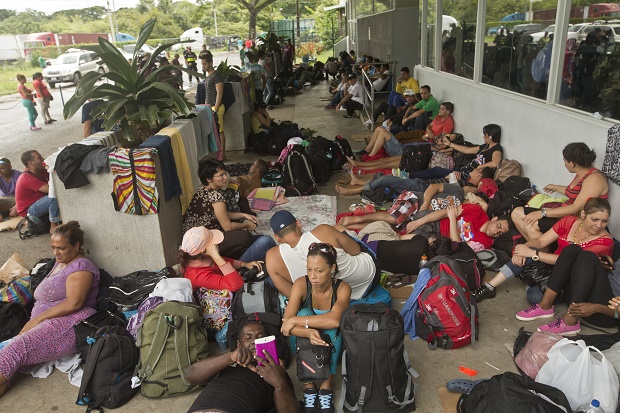Costa Rica splits from C. America body over migrant crisis

In this Nov. 16, 2015 file photo, Cuban migrants sit outside a Costa Rican immigration building on the border with Nicaragua, in Penas Blancas, Costa Rica, after Nicaragua closed its border to all Cuban migrants, leaving them stuck in Costa Rica. Costa Rica plans to raise the ongoing issue of 5,000 Cuban migrants stranded within its borders when Central America’s leaders meet in El Salvador on Friday, Dec. 18. AP File Photo
SAN JOSÉ, Costa Rica—Costa Rica on Friday partially pulled out of SICA, a regional body promoting Central American cooperation, after neighboring nations refused to help handle a growing Cuban migrant crisis.
President Luis Guillermo Solis announced the decision at a news conference on his return from a SICA summit in El Salvador that failed to reach agreement on the fate of thousands of US-bound Cubans stuck in Costa Rica since mid-November.
He also declared his country would be giving no more transit visas to any arriving Cubans and would instead “deport them to their country of origin.”
There are more than 5,000 Cubans in the country with the temporary visas, stuck near the border with Nicaragua, and the immigration service said another 2,000 were looking to join them.
Solis said Costa Rica was suspending its political participation in SICA, the Central American Integration System, because it “cannot participate in a body that does not respect a fundamental, basic principle that is solidarity.”
Article continues after this advertisementIt was not pulling out entirely, though: Solis said Costa Rica would continue its economic participation in the body.
Article continues after this advertisementFrustration
The political suspension underlined Costa Rica’s frustration over the migrant crisis, sparked by a November 15 decision by its northern neighbor Nicaragua—a Cuban ally—to close its border to Cubans.
That exasperation was already apparent when Solis abruptly left the summit in San Salvador before it finished, after failing to convince other members to help.
Nicaragua’s government issued a statement after Friday’s summit demanding “the United States find a solution” for the Cubans.
“The situation should be resolved not by Central America but by the United States since it is the one that has prompted many Cubans to want to try to get to it,” Nicaraguan Deputy Foreign Minister Denis Moncada told AFP.
Cubans managing to reach America benefit from a Cold War-era policy permitting them to live in the US.
The number of Cubans trying to make the journey jumped this year out of fear that policy could soon be scrapped given the thaw in US-Cuban ties announced in December 2014.
With the US Coast Guard sending back Cubans found crossing the Florida Straits, many are trying to fly to South America so they can make their way to the US border overland through Central America and Mexico.
But Ecuador, their entry point to the continent and another Cuban ally, recently closed the door to the migrants by suddenly requiring them to get visas.
Yet thousands of Cubans are already on the trail, relying on people smugglers and bribe-taking officials to let them through.
Costa Rica in November dismantled a people-smuggling ring the Cubans had been using, inadvertently bringing the migratory flux out into the open.
Bad relations with Nicaragua, with which Costa Rica has had several border disputes—including one resolved this week in its favor by the International Court of Justice—have stood in the way of a diplomatic accord.
Several of the other countries represented at the summit, which included host El Salvador, Guatemala, Panama, Belize and the Dominican Republic, called for a solution, but offered nothing concrete beyond insisting a consensus was needed.
The stranded Cubans are being put up in schools and tents in northern Costa Rica, waiting for the chance to continue their odyssey north.
RELATED STORIES
Cuba blames US for instigating surge of migrants from island